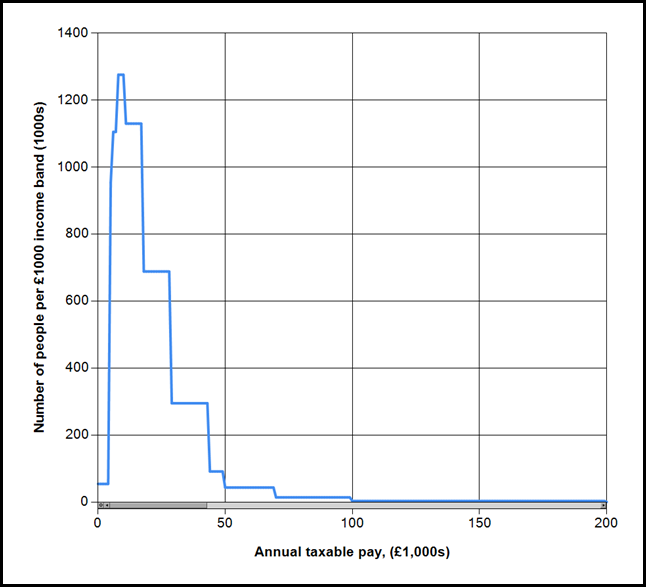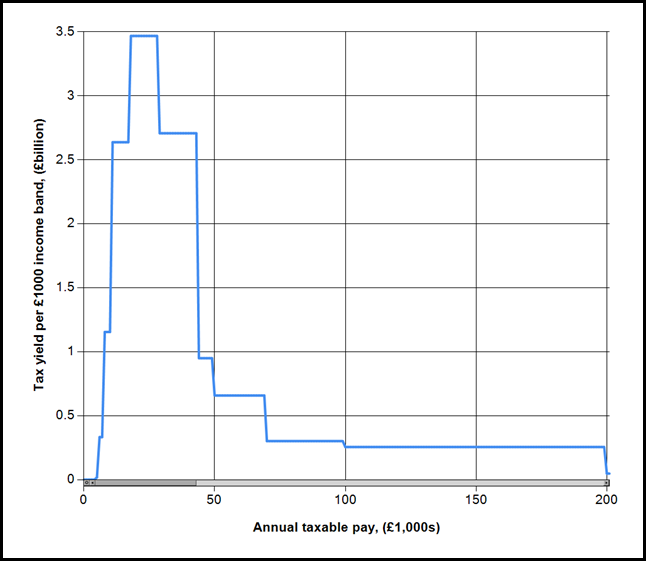Author's posts
Oct 31 2010
Yields from income tax
This post is a tour of income tax and personal national insurance yields, it’s motivated by an interest in seeing how one might pay for a part of the reduction in the deficit through taxation. The reason for focusing particularly on income tax is that it yields a fairly large fraction of the total tax income (28.7% in income tax and 46.6% income tax and national insurance combined), as discussed in a previous post; this means that relatively large amounts of money are raised by relatively small changes when compared to other taxes. Furthermore it’s relatively easy to calculate: I can work out how much income tax I pay in a year but would struggle to tell you how much VAT I pay per year, the impact of a tax on insurance premiums the effect of a change on duty and so forth. Thirdly, it is the tax that is most transparently progressive, in the technical sense that the more you earn the greater the fraction of your income you pay in tax.
This calculation is based on a calculation of personal tax rates from wikipedia, this figure generates the tax rates programmatically and I simply translated the code to my computer language of choice – I thought about doing it in a spreadsheet but that turned out to be a bit brainbending. The second component of the calculation is the number of people in each income bracket: this information along with further information on incomes can also be found on wikipedia. Ultimately the data come from the HMRC. I’ve put these two bits of data together into a program which enables me to fiddle with tax rates, tax thresholds and so forth. It appears to be approximately correct since it matches roughly HMRC’s own figures on the effects of small perturbations to the tax system (pdf). This also tells you it’s possible to look this stuff up – but I find it more fun to calculate it myself! It’s also a good illustration of the general process of how to go about repeating someones calculations from literature sources: try to reproduce their graphs; try to match the summary numbers they produce.
This first figure shows the income and national insurance payable as a fraction of gross (total) pay as a function of pay. The thing I hadn’t appreciated intuitively is that the tax banding system gives quite a smooth increase in percentage tax take, this is because you only pay raised rates on the fraction of your income that lies above the threshold:
Extending the horizontal scale out towards incomes of £1,000,000 and the rate tends to 50%. The next figure shows the distribution of incomes, in the UK:
You can see the same information in text form here. The area under this curve between points on the horizontal axis tells you the number of people in an income band. The median income in the UK is £26k per annum – half the population earn more than this, half less. About 1% of the population earns more than about £100k per annum. This final figure shows the amount that each income band pays according to the latest tax rates.
To summarise this final figure in tax bands, the 20% band accounts for about 57% of tax paid, the 40% band for 26% and the 50% band for 17%. These bands contain respectively 90%, 9% and 1% of the income tax paying population.
In case you’re curious my salary puts me close to the top of the basic rate tax band.
To apply the knowledge embedded in these graphs to some recent problems:
As a rule of thumb: 1p on basic gives about £4bn, 1p on upper rate gives £0.75bn, 1p on the new 50% band gives £0.31bn. The reason for this sharpish dropoff is that relatively few people are effected by the upper rate tax changes so to yield a large tax income the rates have to be changed by a relatively large amount.
Reducing the threshold of the 40% tax band to £40k from £43k yields about £3bn.
The £20billion cut in welfare benefits is equivalent to approximately 5p on the basic rate of income tax, taking it to 24.5% from 20%. This would cost me about £1700 per year.
Tuition fees cost about £7.5billion (based on 1.5 million students each requiring an average £5k tuition fees per year), this is about 2p on basic rate. This would cost me about £800 per year.
The £2.5billion income gained from cutting child benefit from those in the upper tax band could be paid for with an increase in the upper rate to ~43% from 40%. Although it seems the £2.5billion figure is dubious. I can’t help thinking simply increasing the upper rate by this amount, rather than a convoluted attempt at clawback would be simpler. This isn’t to say I support the idea of paying child benefit to all regardless of income, just that implementing withdrawal in this way is technically complicated. This tax rise wouldn’t cost me anything!
I’ve not seen anybody volunteering for these tax increases to support their favoured causes, rather they prefer a range of schemes of dubious value impacting other people to avoid the problem falling upon themselves – a subject for my next post.
Note
This modelling was done using Visual C# running under Windows 7, if you’re interested either in the code or in just the application then let me know in the comments below (or on twitter). There are a couple of minor bits of tidying I’d like to do before release. Please note that the application is “good enough for blogging work” and should not be considered an accurate tool for tax calculations – it’s a toy to help me understand things!
Oct 27 2010
Questions for undergraduates… cabinet edition
Thinking back many years to my first fraught days as an undergraduate, the three questions that came up most frequently as icebreakers between students were:
- Where are you from?
- What were your A-level results?
- What degree are you doing?
In this post I thought I would answer the third question, for members of the cabinet. The data is all culled from wikipedia:
| Prime Minister | David Cameron | Politics, Philosophy and Economics (Oxford) |
| Deputy Prime Minister | Nick Clegg | Social Anthropology (Cambridge), Political Philosophy (Minnesota), MA European affairs(College of Europe) |
| Foreign and commonwealth affairs | William Hague | Politics, Philosophy and Economics (Oxford), Master of Business Administration (INSEAD) |
| Chancellor of the Exchequer | George Osborne | History (Oxford) |
| Justice | Kenneth Clarke | Law (Cambridge) |
| Home department | Teresa May | Geography (Oxford) |
| Defence | Liam Fox | Medicine (Glasgow) |
| Business, Innovation and Skills | Vince Cable | Economics and Natural Sciences (Cambridge), PhD Economics (Glasgow) |
| Work and Pensions | Iain Duncan Smith | Sandhurst |
| Energy and Climate Change | Chris Huhne | Certificate in French language and civilisation (Sorbonne); Politics, Philosophy and Economics (Oxford) |
| Health | Andrew Lansley | Politics (Exeter) |
| Education | Michael Gove | English (Oxford) |
| Communities and local government | Eric Pickles | Law (Leeds Polytechnic) |
| Transport | Philip Hammond | Politics, Philosophy and Economics (Oxford) |
| Environment, food, rural affairs | Caroline Spelman | European Studies (Queen Mary College) |
| International Development | Andrew Mitchell | History (Cambridge) |
| Northern Ireland | Owen Paterson | History (Cambridge) |
| Scotland | Michael Moore | Politics and Modern History (Cambridge) |
| Wales | Cheryl Gillian | Law |
| Culture Olympics Media and sport | Jeremy Hunt | Politics, Philosophy and Economics (Oxford) |
| First secretary to the treasury | Danny Alexander | Politics, Philosophy and Economics (Oxford) |
| Leader of the House of Lords | The Lord Strathclyde | Bachelor of Arts (UEA) |
| Minister without portfolio | The Baroness Warsi | Law (Leeds) |
As a scientist this is both depressing and comforting, depressing because of 23 members only 2 has any sort of scientific training: Liam Fox and Vince Cable (the latter of whom only did science in his first year). Comforting because at least we don’t get the blame!
It also highlights once again the dominance of the Politics, philosophy and economics degree at Oxford in providing Cabinet ministers – I haven’t checked but I believe this applies to previous cabinets.
Oct 25 2010
Fun with fluids!
 Back to some science stuff again, I’ve been meaning to do a blog post on smoke rings for a while, thinking that a simple description of what’s going on would be rather nice. The image to the right is of a “steam” ring blown by Mount Etna.
Back to some science stuff again, I’ve been meaning to do a blog post on smoke rings for a while, thinking that a simple description of what’s going on would be rather nice. The image to the right is of a “steam” ring blown by Mount Etna.
The explanation of smoke rings goes into the field of “fluid dynamics”; to a physicist a fluid is a liquid or a gas – some of the examples linked to here are of gas-in-gas rings (like the smoke ring), some are liquid-in-liquid rings and some are gas-in-liquid rings (bubble rings), the underlying physics is always the same.
A smoke ring is an example of a more general phenomena called a “vortex ring”. Scientists aren’t the only ones interested in fluid dynamics: this is a video of a dolphin playing with bubble ring. My fluid dynamics textbook helpfully points out that the velocity field around a vortex ring is equivalent mathematically to the magnetic field lines around a loop of current carrying wire. For a physicist this is a useful statement because it means you can carry across your understanding in one area to another – for non-physicists less so.
A vortex ring is made by pushing a pulse of fluid through a hole, friction slows down the fluid close to the edges of the hole whilst the fluid in the centre of the hole continues to move more quickly. On leaving the hole, fluid at the edges is rotating around the perimeter of the ring. Push the air to fast and the vortex ring won’t form, it’ll be destroyed by turbulence. You can see how this works in the image below (or, perhaps better, this video). The smoke in a smoke ring is only there to highlight what the air is up to – in liquids dyes can be used to reveal the patterns of liquid flow, or small particles. In the laboratory, small particles suspended in liquid can be illuminated by sheets of laser light to provide cross-sections through the flow patterns.
The first surprising thing about smoke rings is their persistence – for a gassy disturbance they maintain their shape for a remarkably long time. The smoke is actually trapped inside the vortex, and can only diffuse away slowly. By their very nature vortex rings are obliged to travel along in the direction of their axis, as the core of the vortex ring gets larger the forward motion of the ring slows.
Beyond simple vortex rings: we can also see vortex rings colliding and breaking up into rings of rings, and vortex rings overtaking – a faster vortex ring forces a slower one to expand whilst it passes through. These behaviours are all understandable using fluid dynamics, and can be simulated in a computer.
Vortices can also be found in lines, a vortex ring is simply a vortex line with the two loose ends tied together. Tornados and the whirlpool of water going down the plughole in the bath are examples of vortex lines.
Vortex rings are simply one facet of fluid behaviour arising from “vorticity”, that’s to say the behaviour of spinning packets of fluid. The “packets” being a handy conceptual device of breaking up a body of fluid into little pieces for further consideration. From a historical point of view, vortex lines were first understood by Helmholtz (1858), with some details added later by Kelvin (1867). What’s interesting about the Kelvin paper is that it was written at a time when the existence and understanding of atoms was in it’s infancy and there was some thought that atoms may be made from vortex rings (this turns out not to be true).
More generally fluids are understood using the Navier-Stokes equations which are a combination of Newton’s laws for fluids (forces make things move), viscosity (friction for liquids) and pressure. Beyond this the effects of surface tension, chemical reactions and magnet and electric fields to introduce ever more complexity. Even with the equations in hand, there is a large difficulty in solving them to produce useful results – just how fast can I pump liquid through this complicated shape?
Research into fluid dynamics is important for practical reasons (like making aeroplanes fly, simulating the weather and understanding how liquids move through all manner of mechanical devices from aerosol sprays to hydroelectric power plants) but it’s also just plain fun.
These videos of vortex rings are well worth a look:
- Dolphins playing with vortex rings
- Vortex ring collision
- Vortex ring, overtaking manoeuvre
- Computer simulation of a vortex ring
There’s many more like this, try searching You Tube for “vortex rings”.
Oct 14 2010
Book review: God’s Philosophers by James Hannam
 I seem to be on a run of book reviewing at the moment, as I’ve indicated before these are as much for me as they are for you! This weeks contribution is on “God’s Philosophers: How the Medieval World laid the foundations of Modern Science“ by James Hannam. This book looks at the development of science, or at least a precursor to modern science, during the Middle Ages (5th-15th century). This fits in with my previous book reviewing which has gone back to the founding of the Royal Society (1662), and a little earlier with Gerard Mercator (1512-1594).
I seem to be on a run of book reviewing at the moment, as I’ve indicated before these are as much for me as they are for you! This weeks contribution is on “God’s Philosophers: How the Medieval World laid the foundations of Modern Science“ by James Hannam. This book looks at the development of science, or at least a precursor to modern science, during the Middle Ages (5th-15th century). This fits in with my previous book reviewing which has gone back to the founding of the Royal Society (1662), and a little earlier with Gerard Mercator (1512-1594).
To my mind the book makes a poor start in the introduction by telling me how everything I believe about the Middle (or Dark) Ages is wrong, and so is everyone else. I’m prepared to accept that my visualisation of the Dark Ages, as being quite literally Dark with peasants fumbling around in a permanent twilight may be wrong, however this type of introduction generally leaves me believing that the writer is a conspiracy theorist!
A recurring theme of the book is how those studying natural philosophy (a convenient term for the proto-science) continually ran the risk of being accused of heresy. Hannam seems to portray the treatment of heresy as not really so bad: only 1 in 20 trials resulted in burning at the stake, there wasn’t much torture, the victim was asking for it, the church handed over the heretics to the secular authorities who carried out the most terrible punishment. This seems to treat lightly the death, by burning at the stake, of people who simply believed something different. Perhaps more insidiously anyone studying natural philosophy had to have an eye to what the church believed in case what they studied was considered to be heretical. Later Hannam’s defence turns out to be more narrowly defined: he sees himself as defending the Catholic Church against Protestants. He reserves a special ire for humanists, those in the Renaissance who had a particular fondness for studying the ancient classics.
This said, the book is a nice overview of the development of the academic life after the fall of the Roman Empire, with the early universities in Italy and France growing up as offshoots from the great cathedrals. The very earliest of these institutions taught law, and sometime later medicine although the core of early teaching was in theology. A great deal of effort was expended in recovering the work of the Ancients (Greek philosophers) this was made difficult by the absence of much knowledge of Greek in Western Europe. The Arabs had picked up much of this material in an earlier period but translated it into Arabic rather than Greek whilst Western Europe had Latin as a common scholarly language. Interest was primarily in Aristotle, although later the works of Plato were re-discovered. In some ways it’s this aspect of the Middle Age and Renaissance enterprise which is so confusing to a modern scientist. It just looks like it would be far easier, and quicker, to make a fresh start and discover things for yourself rather than dredge through ancient, partial manuscripts in ill-known languages for clues.
There are various places in the book where I can feel myself trying to shout back through the ages “Yes, yes, you’re on the right track, keep going!”. Only to see the protagonist draw back at the last minute or for their work to be subsequently ignored. Examples include Nicole Oresme (1323-1382) and his use of graphs in understanding physical ideas. Or the theory of impetus developed by Jean Buridan (~1300-1358), which is a very direct precursor of modern theories of mechanical motion. Similarly isolated sparks spoke of doing controlled experiments to test theories, and the idea that mathematics could be used to describe physical processes. However these ideas did not seem to start drawing together until the period in which Galileo lived (1564-1642).
The part that astrology played in the development of astronomy is rather illuminating, as part of their programme the astrologers wanted to known exactly where heavenly bodies would be at some point in time in the past or future therefore they expended considerable, skilled effort in measuring the locations of these bodies and building models from these measurements. This was the work that lead Copernicus to propose a heliocentric solar system, and would have fed into Newton’s work on gravity, and all done for completely ridiculous reasons. This also highlights some of the oddities in the thinking of the early pioneers of the modern period, for example William Gilbert, who did excellent work on magnetism did it in a distinctly odd framework – he believed the magnet was the soul of a planet, similarly William Harvey’s work on the circulation of blood and Isaac Newton’s obsessive alchemy and bible study.
During the Middle Ages there were various technological developments: the mechanical clock (Norwich, 1273), spectacles (Venice, 1300), modern printing (by Gutenberg around 1439). Paper making had been brought to Europe at some time before 1276 when the first paper mill is recorded in central Italy. Gunpowder was first mentioned in Europe by Roger Bacon (1267), having been invented in China in around the 9th century. These inventions largely arose outside of the university system.
The book ends with the death of Galileo in 1642, who had been subjected to a trial for heresy following which he was held under house arrest for the remainder of his life. The book makes clear, that in common with Newton, Galileo was “standing on the shoulders of giants” drawing heavily on work in the Middle Ages – although synthesising into a coherent whole, making his own additions and also covering a large range of topics over his lifetime.
Finally there is a timeline, a cast of characters and a nice, manageable set of further readings.
I feel ambivalent about this book, the historical aspects of it I found very interesting, the proselytising less so. It seems evident that there was progress in proto-science during the Middle Ages, and also in technology. Hannam claims that the Catholic Church facilitated this progress; the evidence he presents is mixed – they supported scholarship and the founding of universities but simultaneously ran a system of Inquisition to detect heresy which made free academic enquiry difficult.
Oct 11 2010
Early reports of the Royal Society
In an earlier post I wrote about Thomas Sprat’s “History of the Royal Society of London, for the improving of Natural Knowledge“. Published in 1667, under the direction of the Royal Society which had first met in 1660, receiving their royal charter in 1662. In that post I deferred discussion of a selection of the early reports of the Society that were embedded in the History, for reasons of space.
The reports by title are these:
- Answers returned by Sir Philberto Vernatti (Resident of Batavia in Java Major)
- A Method for making a History of the Weather by Mr Hook
- Directions for the Observations of the Eclipses of the Moon by Mr Rooke
- A Proposal for Making Wine by Dr. Goddard
- A Relation of the Pico Teneriffe
- Experiments of the Weight of Bodies increased in the Fire by Lord Brouncker
- Experiments of a Stone called Oculus Mundi by Dr Goddard
- An account of a Dog dissected by Mr Hook
- Experiments of the Recoiling of Guns by Lord Brouncker
- The History of the Making of Salt-Peter and The History of Making Gunpowder by Mr Henshaw
- An Apparatus to the History of the Common Practices of Dy[e]ing by Sir William Petty
- The History of the Generation and ordering of Green Oysters Commonly called Colchester-Oysters
Interspersed amongst them Sprat adds in various brief comments on other work of the Society along with what amounts to a personal eulogy to Christopher Wren, who seems to have been involved in pretty much everything although Sprat seems to have been generous in attributing to Wren work which was largely done by other people.
Looking first at the authors: of Sir Philberto Vernatti I can find little, he appears to have been Governor of Batavia (now Jakarta) for the Dutch East India Company whilst most references I’ve found to him arise from this report to the Royal Society; Mr Hook was the first curator of experiments for the Royal Society and paid an important role in keeping the Society with interesting things to see, he was an outstanding scientist in his own right; Lord Brouncker was the first President of the Royal Society; Mr Rooke appears to have been Lawrence Rooke, who died in 1662; Dr Goddard is Dr Jonathan Goddard the early Society met in his lodgings at Gresham College, physician to Charles I and present at the death of Cromwell; Mr Henshaw is Thomas Henshaw an early Biological Sciences Secretary to the Royal Society; Sir William Petty was amongst other things an economist and a Parliamentarian in the Civil War. On the whole these reports look like they have been selected on political grounds, they are from the movers and shakers of the Society.
The contributions vary considerably in length and content, Dr Goddard’s proposal on making wine amounts to: “Do it in the West Indies using sugar cane”, similarly Mr Hooks account of dissecting a dog is very brief (it’s also pretty horrifying).
The reports on dyeing, oysters and the making of Salt-peter and gunpowder are quite detailed reviews of the current “state-of-the-art” in important trades, involving both references to previous literature and reports of current practice which read very much as if the authors had gone and observed the processes described. The answers returned by men in distant places: Sir Philoberto Vernatti in Batavia, Java and the report on the scaling of Pico Teneriffe are also very much directed to trade: does this wood grow well there? These are quite lengthy and range over quite a range of topics. From this it’s clear that the Royal Society wanted to be seen as contributing to the national wealth.
The reports by Hooke (on recording the weather), Rooke, Brouncker and Goddard (on Oculus mundi) are those which most closely resemble modern scientific papers. They report methods for conducting measurements, or the results of those measurements, unlike modern papers they do not draw strong conclusions from those measurements. In a sense they are following the scheme laid out by Sprat in which empirical measurement is important and theorising comes later. Oculus Mundi is a form of opal now known as hydrophane which goes transparent when it absorbs water, the OED reports that Sir Kenelme Digby had brought some of this material to the Society in 1661.
In sum it looks like the early Society was very busy. Much of what they wrote was very practical and aside from a comment on making insects from cheese and sack it largely looks quite sensible. In these reports I can see the origins of the primary scientific literature that I access as part of my work.


